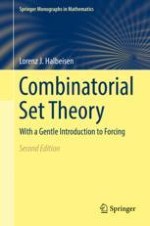2017 | OriginalPaper | Buchkapitel
14. Martin’s Axiom
verfasst von : Lorenz J. Halbeisen
Erschienen in: Combinatorial Set Theory
Aktivieren Sie unsere intelligente Suche, um passende Fachinhalte oder Patente zu finden.
Wählen Sie Textabschnitte aus um mit Künstlicher Intelligenz passenden Patente zu finden. powered by
Markieren Sie Textabschnitte, um KI-gestützt weitere passende Inhalte zu finden. powered by
